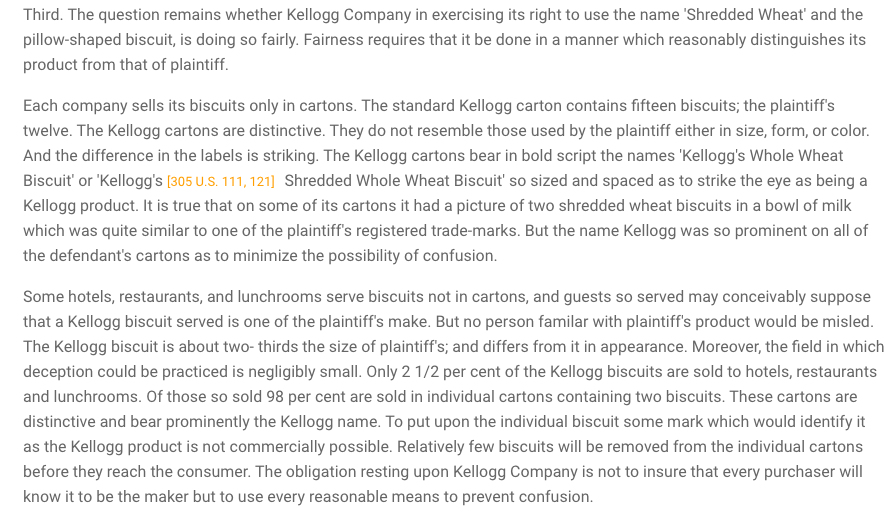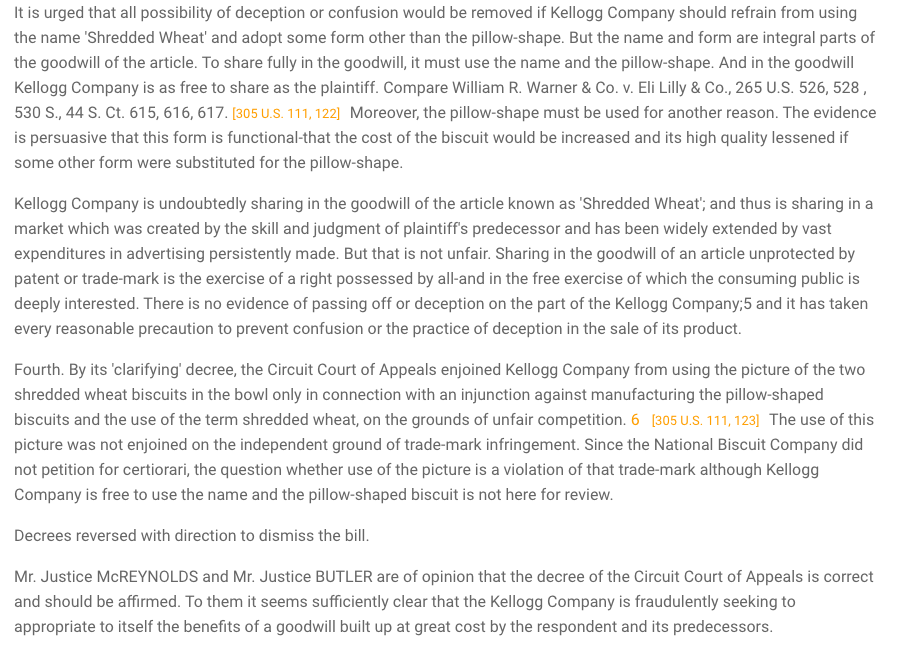Can you help me to summarize two main ideas in the paragraphs below ? Thank you very much for your helping.
Third. The question remains whether Kellogg Company in exercising its right to use the name 'Shredded Wheat' and the pillow-shaped biscuit. is doing so fairly. Fairness requires that it be done in a manner which reasonably distinguishes its product from that of plaintiff. Each company sells its biscuits only in cartons. The standard Kellogg carton contains fteen biscuits; the plaintiff's twelve. The Kellogg cartons are distinctive. They do not resemble those used by the plaintiff either in size, form, or color. And the difference in the labels is striking. The Kellogg cartons bear in bold script the names 'Kellogg's Whole Wheat Biscuit' or 'Kellogg's [so-3 us. 1'11, 121] Shredded Whole Wheat Biscuit' so sized and spaced as to strike the eye as being a Kellogg product. It is true that on some of its cartons it had a picture of two shredded wheat biscuits in a bowl of milk which was quite similar to one of the plaintiff's registered trade-marks. But the name Kellogg was so prominent on all of the defendant's cartons as to minimize the possibility of confusion. Some hotels. restaurants, and lunchrooms serve biscuits not in cartons. and guests so served may conceivably suppose that a Kellogg biscuit served is one of the plaintiff's make. But no person familar with plaintiff's product would be misled. The Kellogg biscuit is about two- thirds the size of plaintiff's; and differs from it in appearance. Moreover, the eld in which deception could be practiced is negligibly small. Only 21.12 per cent of the Kellogg biscuits are sold to hotels, restaurants and lunchrooms. Of those so sold 93 per cent are sold in individual cartons containing two biscuits. These cartons are distinctive and bear prominently the Kellogg name. To put upon the individual biscuit some mark which would identify it as the Kellogg product is not commercially possible. Relatively few biscuits will be removed from the individual cartons before they reach the consumer. The obligation resting upon Kellogg Company is not to insure that every purchaser will know it to be the maker but to use every reasonable means to prevent confusion. It is urged that all possibility of deception or confusion would be removed if Kellogg Company should refrain from using the name 'Shredded Wheat' and adopt some form other than the pillow-shape. But the name and form are integral parts of the goodwill of the article. To share fully in the goodwill. it must use the name and the pillow-shape. And in the goodwill Kellogg Company is as free to share as the plaintiff. Compare William R. Warner 3. Co. v. Eli Lilly 8. Co., 265 US. 526. 523. 530 8.. 44 S. Ct. 615, 616, 61?. [305 u.s.111.122] Moreover, the pillow-shape must be used for another reason. The evidence is persuasive that this form is functional-that the cost of the biscuit would be increased and its high quality lessened if some other form were substituted for the pillow-shape. Kellogg Company is undoubtedly sharing in the goodwill of the article known as 'Shredded 1ii'ii'heat'; and thus is sharing in a market which was created by the skill and judgment of plaintiff's predecessor and has been widely extended by vast expenditures in advertising persistently made. But that is not unfair. Sharing in the goodwill of an article unprotected by patent or trade-mark is the exercise of a right possessed by all-and in the free exercise of which the consuming public is deeply interested. There is no evidence of passing off or deception on the part of the Kellogg Company;5 and it has taken every reasonable precaution to prevent confusion or the practice of deception in the sale of its product. Fourth. By its 'clarifying' decree. the Circuit Court of Appeals enjoined Kellogg Company from using the picture of the two shredded wheat biscuits in the bowl only in connection with an injunction against manufacturing the pillow-shaped biscuits and the use of the term shredded wheat, on the grounds of unfair competition. 6 1305 u.s.111.123] The use of this picture was not enjoined on the independent ground of trade-mark infringement. Since the National Biscuit Company did not petition for certiorari. the question whether use of the picture is a violation of that trade-mark although Kellogg Company is free to use the name and the pillow-shaped biscuit is not here for review. Decrees reversed with direction to dismiss the bill. Mr. Justice McREYNOLDS and Mr. Justice BUTLER are of opinion that the decree of the Circuit Court of Appeals is correct and should be afrmed. To them it seems sufciently clear that the Kellogg Company is fraudulently seeking to appropriate to itself the benets of a goodwill built up at great cost by the respondent and its predecessors








